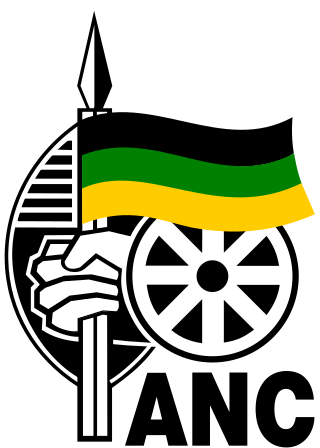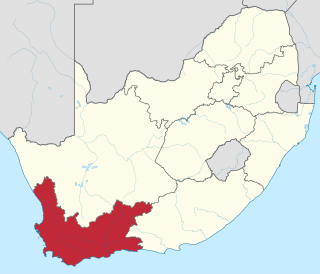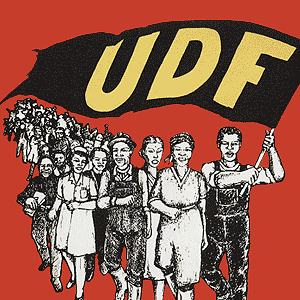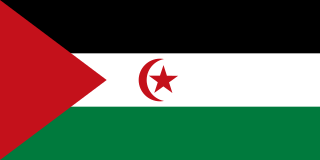
The African National Congress (ANC) is a social-democratic political party in South Africa. A liberation movement known for its opposition to apartheid, it has governed the country since 1994, when the first post-apartheid election installed Nelson Mandela as President of South Africa. Cyril Ramaphosa, the incumbent national President, has served as President of the ANC since 18 December 2017.

After independence in 1964 the foreign relations of Zambia were mostly focused on supporting liberation movements in other countries in Southern Africa, such as the African National Congress and SWAPO. During the Cold War Zambia was a member of the Non-Aligned Movement.

The Democratic Republic of the Congo (DRC), also known as Congo-Kinshasa and formerly known as Zaire, is a country in Central Africa. By land area, the DRC is the second-largest country in Africa and the 11th-largest in the world. With a population of around 112 million, the Democratic Republic of the Congo is the most populous officially Francophone country in the world. The national capital and largest city is Kinshasa, which is also the economic center. The country is bordered by the Republic of the Congo, Central African Republic, South Sudan, Uganda, Rwanda, Burundi, Tanzania, Zambia, Angola, the Cabinda exclave of Angola and the South Atlantic Ocean.

The South West Africa People's Organisation, officially known as the SWAPO Party of Namibia, is a political party and former independence movement in Namibia. Founded in 1960, it has been the governing party in Namibia since the country achieved independence in 1990. The party continues to be dominated in number and influence by the Ovambo ethnic group.

The Western Cape is a province of South Africa, situated on the south-western coast of the country. It is the fourth largest of the nine provinces with an area of 129,449 square kilometres (49,981 sq mi), and the third most populous, with an estimated 7 million inhabitants in 2020. About two-thirds of these inhabitants live in the metropolitan area of Cape Town, which is also the provincial capital. The Western Cape was created in 1994 from part of the former Cape Province. The two largest cities are Cape Town and George.

The Zimbabwe African National Union – Patriotic Front (ZANU–PF) is a political organisation which has been the ruling party of Zimbabwe since independence in 1980. The party was led for many years under Robert Mugabe, first as prime minister with the Zimbabwe African National Union (ZANU) and then as president from 1987 after the merger with the Zimbabwe African People's Union (ZAPU) and retaining the name ZANU–PF, until 2017, when he was removed as leader.

The Congress of South African Trade Unions is a trade union federation in South Africa. It was founded in 1985 and is the largest of the country's three main trade union federations, with 21 affiliated trade unions.

Dulcie Evonne September was a South African anti-apartheid political activist. Born in Athlone, Western Cape, South Africa, she was assassinated in Paris, France.

The East African Community (EAC) is an intergovernmental organisation composed of seven countries in the Great Lakes region of East Africa: the Democratic Republic of the Congo, the United Republic of Tanzania, the Republics of Kenya, Burundi, Rwanda, South Sudan, and Uganda. Évariste Ndayishimiye, the president of Burundi, is the current EAC chairman. The organisation was founded in 1967, collapsed in 1977, and was revived on 7 July 2000.

The United Democratic Front (UDF) was a South African popular front that existed from 1983 to 1991. The UDF comprised more than 400 public organizations including trade unions, students' unions, women's and parachurch organizations. The UDF's goal was to establish a "non-racial, united South Africa in which segregation is abolished and in which society is freed from institutional and systematic racism." Its slogan was "UDF Unites, Apartheid Divides." The Front was established in 1983 to oppose the introduction of the Tricameral Parliament by the white-dominated National Party government, and dissolved in 1991 during the early stages of the transition to democracy.
Lionel Davis is a visual artist, teacher, and public speaker from South Africa. He was born in Cape Town, South Africa, in 1936 in the infamous District Six neighborhood. He was a prominent figure in the anti-apartheid movement, and was incarcerated for seven years on Robben Island, an infamous prison for political prisoners under the apartheid regime. It was here that Davis met Nelson Mandela.

The African Union (AU) is a continental union consisting of 55 member states located on the continent of Africa. The AU was announced in the Sirte Declaration in Sirte, Libya, on 9 September 1999, calling for the establishment of the African Union. The bloc was founded on 26 May 2001 in Addis Ababa, Ethiopia, and launched on 9 July 2002 in Durban, South Africa. The intention of the AU was to replace the Organization of African Unity (OAU), established on 25 May 1963 in Addis Ababa by 32 signatory governments; the OAU was disbanded on 9 July 2002. The most important decisions of the AU are made by the Assembly of the African Union, a semi-annual meeting of the heads of state and government of its member states.

South Africa, officially the Republic of South Africa, is the southernmost country in Africa. It is bounded to the south by 2,798 kilometres (1,739 mi) of coastline that stretches along the South Atlantic and Indian Oceans; to the north by the neighbouring countries of Namibia, Botswana, and Zimbabwe; and to the east and northeast by Mozambique and Eswatini. It also completely enclaves the country Lesotho. It is the southernmost country on the mainland of the Old World, and the second-most populous country located entirely south of the equator, after Tanzania. South Africa is a biodiversity hotspot, with unique biomes, plant and animal life. With over 60 million people, the country is the world's 24th-most populous nation and covers an area of 1,221,037 square kilometres. Pretoria is the administrative capital, while Cape Town, as the seat of Parliament, is the legislative capital. Bloemfontein has traditionally been regarded as the judicial capital. The largest city, and site of highest court is Johannesburg.

Neville Edward Alexander was a proponent of a multilingual South Africa and a former revolutionary who spent ten years on Robben Island as a fellow-prisoner of Nelson Mandela.

The Southern Kings were a South African professional rugby union team that competed in Super Rugby and Pro14. They were based in Port Elizabeth in the Eastern Cape province and played their home matches at Nelson Mandela Bay Stadium. They were created in 2009, and had their first match against the British & Irish Lions during their 2009 tour. After competing in Super Rugby in 2013, 2016 and 2017, they joined Pro14 prior to the 2017–18 season, along with the Cheetahs.
The Non-European Unity Movement (NEUM) is a Trotskyist organisation formed in South Africa in 1943. It had links to the Workers Party of South Africa (WPSA), the first countrywide Trotskyist organisation, and was initially conceived as a broad protest front. It proposed a 10 Point Programme of radical reforms. It stressed non-racialism, meaning that it rejected race-based organising, unlike the main nationalist groups of the time, was highly critical of the South African Communist Party and the African National Congress, and made a principle of non-collaboration with the apartheid regime and its allies

South Sudan, officially the Republic of South Sudan, is a landlocked country in Central Africa and politically grouped in Eastern Africa region. It is bordered by Ethiopia, Sudan, the Central African Republic, the Democratic Republic of the Congo, Uganda, and Kenya. Its population was estimated at 11,088,796 in 2023. Juba is the capital and largest city.

The Sahrawi Arab Democratic Republic, also known as the Sahrawi Republic and Western Sahara, is a partially recognized state, recognised by 45 UN member states, located in the western Maghreb, which claims the non-self-governing territory of Western Sahara, but controls only the easternmost one-fifth of that territory. Between 1884 and 1975, Western Sahara was known as Spanish Sahara, a Spanish colony. The SADR is one of the two African states in which Spanish is a significant language, the other being Equatorial Guinea.

Isaac Bangani Tabata (1909-1990), also known as "I.B" or "Tabby", was a South African political activist, author and orator. A Marxist in the Trotskyist tradition, he was central to the Non-European Unity Movement from its inception in 1943, as well as in the African Peoples' Democratic Union of Southern Africa (APDUSA) formed 1961. He is notable for his innovative analyses, theoretical work and lifelong commitment to the movement. Tabata was married to Jane Gool, a major political activist.


















